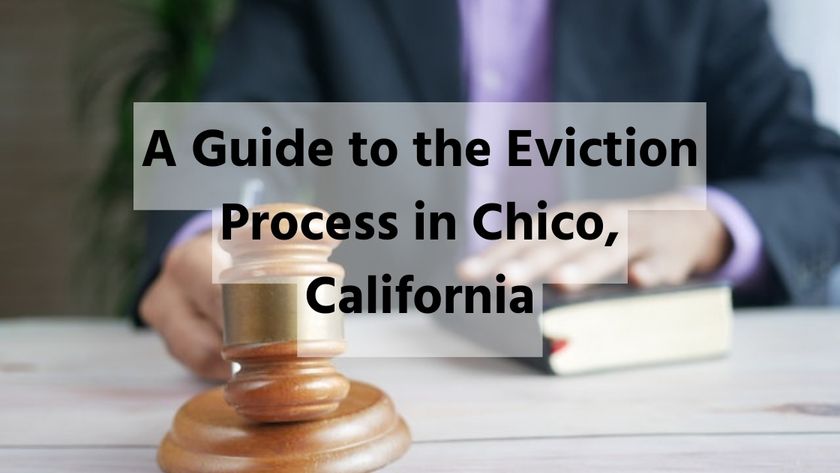A Guide to the Eviction Process in Chico, California

While no landlord wants to evict tenants from their property, sometimes it is necessary. However, like most states, California has its own set of rules and regulations that determine how the eviction process must occur. That’s why we have provided a comprehensive guide to the California eviction laws to help you navigate these difficult situations with tenants like when they fail to pay rent.
We will go over the eviction process in California and reasons for a landlord to legally evict a tenant from the unit prior to the end of the tenancy, which can include lease violations, criminal activity or not paying rent.
1. Legal Causes for Eviction
Under California law, a landlord is legally allowed to evict a tenant and terminate the lease agreement for the following reasons:
- Failing to pay rent.
- Tenants refuse to follow the terms of the lease or rental agreement.
- Failing to uphold their responsibilities as a tenant as described under California Civil Code.
- The tenants stay after their lease agreement has ended (after being provided with proper notice).
- A lease violation or criminal activity on the property.
The type of notice given to the tenant depends on the reason to evict. There are generally 4 different types of notices in California:
- A 3-day notice to pay the rent or quit: this is given to tenants who fail to pay their rent, and gives them the option to rectify the unpaid rent or be evicted.
- 30/60 day period notice to quit: This is for the end of a lease/no lease. The length required depends on how often the tenant pays the rent.
- 3-day notice period to cure or vacate: This is for curable or fixable violations of lease terms, and gives tenants an opportunity to fix the issue or get evicted.

- 3 day unconditional quit notice: This is for violations that are incurable, and it does not give the tenant to rectify the situation to avoid being evicted. These violations can include excessive property damage or illegal activity as a part of the California eviction laws.
2. Serving the Notice
The notice that the landlord serves the tenant must be delivered via the following methods:
- The landlord may deliver the written notice directly to the tenant at the rental unit.
- It may be left with another resident of the rental who is over the age of 18, in addition to mailing a copy to the rental unit.
- The landlord may post it to the front door of the property in addition to mailing a copy to the residence via registered mail.
- The landlord may mail a copy of the it to the property through registered mail, but only in the case of ending a month-to-month tenancy with a 30 or 60-day notice to quit.
Once the notice is served, the tenant will have the amount of days included in the notice to either rectify the situation (if applicable) or vacate the rented area. If neither of these actions is taken, then the landlord may continue with the California eviction lawsuit on legal grounds. Also, make sure to pay a filing fee for any papers.

3. Tenant Eviction Defenses in California
There are some cases in which a tenant may win the eviction case. It is important to note that it is illegal for a landlord to do a retaliatory eviction for the tenant exercising one of their legal rights. These rights include:
- Informing the landlord of an issue on the property.
- Contacting local government or authorities over the issue on the property.
- Supporting, joining or organizing a tenant union.
- Pursuing legal action against the landlord.
- Withholding rental payment due to inhabitable living conditions in the rental.
If a landlord is found guilty of retaliation, they can be sued by their tenants. In California, the landlord must have a legal reason to evict a resident and they cannot legally end a tenancy without cause. According to California law, a landlord must win the eviction case to legally remove a tenant from their property.
4. Attending the Court Hearing
Once the request for a hearing is filed by the landlord, it will be scheduled within a period of 20 days of the initial request. Then, you can continue with the eviction proceedings.

In preparation for the hearing, both the landlord and tenant should be prepared with the following things to help their case in a California court:
- A copy of the lease or rental agreement.
- A copy of the written notice served to the tenant.
- The complaint.
- Any relevant evidence or witnesses that support their case.
Regardless of whether or not the eviction process was contested by the tenant, if the judge ends up ruling in the favor of the landlord, then a Writ of Execution will be issued to the tenant and the eviction process will continue. If the tenant does not show up, a default judgment is usually given in favor of the landlord.
In this state, a tenant cannot halt the eviction by filing an appeal.
5. The Writ of Execution is Issued to the Tenant
The Writ of Execution refers to the final notice that a tenant will receive before being forcibly removed from the property by the local sheriff. This gives the tenant the time to leave the premises and collect their belongings before being removed.
6. Possession of the Property is Returned to the Landlord
After being served with the Writ of Execution, the tenant has 5 days to vacate the property and remove their belongings. If the tenant fails to move within this period of time, the sheriff will then return to the property and forcibly remove the tenant.

The tenant has the option to ask for a stay of execution, which if granted by the court, will delay their eviction for another 40 days. However, this will delay the eviction, not prevent it overall, and after 40 days have passed, the tenant will still be required to leave the property.
Bottom Line
If you have any specific questions about the California eviction process that were not answered in the above blog post, be sure to ask a qualified local attorney for help, or seek assistance from a reputable property management company. We can handle everything from notices to an unlawful detainer lawsuit. We have all property solutions, such as how to evict a tenant, to how to maintain your property, to financial reporting.
Here at IPM Property Management, our property managers make sure that you don’t have to stress about any aspect of your personal property when leasing it in the rental market. Get in touch with us today!
Disclaimer: This blog post should not be used as a substitute for legal advice from a licensed attorney in California. Seek legal advice, as California eviction laws frequently change, and this blog post may not be completely updated at the time of your reading. Please contact us for any questions you may have in regards to the eviction processes in California, the California landlord-tenant law, or for any other aspects of your property management needs.
